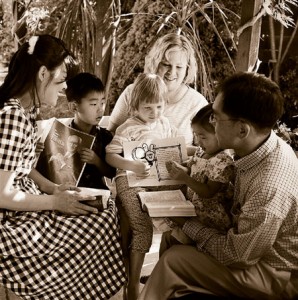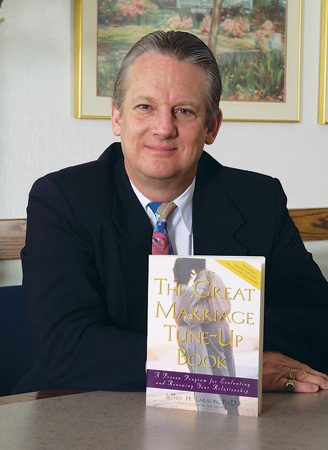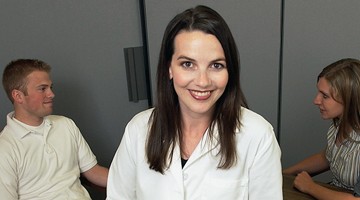
Family, friends, and neighbors can occasionally include divorced people in activities, like family home evening.
By Linda Hunter Adams
The Church of Jesus Christ rightly places great importance on marriage and success in the home. A family offers the best place to develop our talents and gifts, and to learn how to become like our heavenly parents. It offers opportunities for giving love and being loved, for sacrificing for others’ welfare.
No loving couple goes into marriage thinking they will divorce. However, in some marriages there are conditions that make divorce the best option. No matter how close we are to a couple, none of us knows what really is happening in another’s marriage. Only the couple themselves and the Lord know when a marriage is no longer a safe spiritual or physical place. And although divorce affects all closely associated with the couple, the partners themselves are the ones who must decide whether to divorce or to continue in the marriage. It is they who must bear the consequences of that decision.
Speaking of divorce, President James E. Faust of the First Presidency said: “Those marriages performed in our temples, meant to be eternal relationships, then become the most sacred covenants we can make. . . . I have struggled to understand what might be considered ‘just cause.’ . . . Only the parties to the marriage can determine this. They must bear the responsibility for the train of consequences which inevitably follow if these covenants are not honored. In my opinion, ‘just cause’ should be nothing less serious than a prolonged and apparently irredeemable relationship which is destructive of a person’s dignity as a human being” (“Father, Come Home,” Ensign, May 1993, p. 36).
Because divorce has such serious consequences and involves the dissolution of covenants, a couple should make their final decision only after calling on the Lord, working with their bishop, and, if possible, seeing qualified secular counselors. We as outsiders should not judge the decision but should help the people affected move on. Family, friends, and neighbors can be of great support during this period.
The Victims of Divorce
Most Church members take the sacredness of marriage very seriously. So when a marriage is over, it is difficult for members to move on. By the time of a divorce, the amount of damage to a person’s feeling of self-worth usually is extensive, and a sense of failure and worthlessness often prevails. Divorce most personally affects the members of the dissolved household—the husband, the wife, and the children, if any. There is loss of the emotional and physical closeness of the family unit. Although many of the effects of divorce are the same for both men and women, some differ.
It may be harder for divorced men to remain active in the Church. Men—usually the ones to leave the home, the neighborhood, and the ward—miss out on the support systems these groups offer. Most often they no longer have a church calling and find it difficult to get involved in a new ward alone. Because children usually live with the mothers, fathers often lose the joy of seeing their children every day and of sharing in the children’s experiences as they grow up. Sometimes divorced fathers distance themselves from their families because they cannot bear the loss or because remarriage turns their attention to a new family. Fathers need to put forth extra effort to remain involved in the children’s lives. And mothers need to encourage, not just allow, this involvement. Just because a couple gets divorced does not mean they relinquish the responsibility of parenthood. Children need both parents.
After divorce women usually end up financially worse off, often in poverty, and usually are left to do most of the child rearing. Often a lack of marketable skills or a long absence from the workplace forces women into low-paying jobs with long hours, keeping them away from the home and children.
Children of divorce can suffer from not having both parents in the home. Boys often learn how to be men from imitating their fathers. Girls often learn to be women by observing how parents lovingly interact. Children can lose the security of an intact home and often feel they caused the abandonment.
Divorced people need to be careful not to criticize their former mate in their children’s presence. Such criticism tears at half of the child. They should tell their children only those things about the divorce they need to know for their own safety. The children should be assured of each parent’s love. Each parent must develop his or her own relationship with the children, but not at the expense of the former mate. Single parents should not use children as pawns or weapons in their relationship with a former spouse.
The greatest gift given to avoid these problems is forgiveness. It is difficult and takes time, but the Lord commands us “to forgive all men” (D&C 64:10).
Helping Divorced People Move Forward
Because most recently divorced people’s friends are couples, as single people they often no longer fit in. And a divorced person (particularly one with children) doesn’t fit naturally into the “singles” lifestyle. A divorce may cause an awkward situation for the divorced couple and for their friends. Oftentimes friends don’t know what to say or don’t want to choose sides, so they drop the friendship when friends are most needed. Rather, friends shouldn’t try to justify or judge the behavior of either partner. They should have a listening ear for that which is appropriate to be shared and should include the divorced person in their activities. With a little added thought and care, friendships can remain strong.
Being divorced and single is lonely. This loneliness can be alleviated, to some degree, by involving divorced people in worthwhile activities and service. Although divorced people have needs (as does everyone), they should not be perceived as “needy.” Divorced people, have many talents and gifts to share. Service can fill many of the lonely hours. Service and understanding can also be extended to divorced people to help them move forward after divorce. Following are some suggestions of service I found helpful as a divorced single parent.
A ward can function as a family for the single parent. Priesthood blessings can come through the home teachers and the bishopric. Local leaders can ensure that the divorced person has a church calling. Ideally, a calling for a divorced person would involve meaningful interaction with other adults. If the divorced person has just moved into the ward, a calling may help keep him or her from “disappearing.” This may be particularly important for divorced men.
If the visiting teachers and the home teachers are called from the same married couple, then the single parent and the children can enjoy having a family care about them and include them. Two-parent families’ occasionally inviting a single-parent family to family home evening helps the children see how the priesthood functions in the home and how loving couples treat one another.
Single-parent families can join together once a month for family home evening. This peer support helps a divorced person feel that he or she is not alone. And it helps children to know that theirs is not the only home with just one parent.
Ward members can be creative in helping single parents with their financial struggles. One ward’s elders quorum finished the basement of a single mother’s home so she could rent it and thus have some added income that enabled her to stay at home with her young children.
Members can make an extra effort to greet the divorced person when he or she comes to church. It is sometimes uncomfortable for single people to find a place to sit where they don’t feel they are intruding. A simple “Come sit with us” can mean a lot. Members can also invite the divorced person to attend the temple with them. After a divorce a person especially needs the blessings of the temple.
Friends and family can offer help with a specific project such as mowing the lawn, working in the yard for spring cleanup, or fixing a leaky faucet, rather than saying, “If you need any help, let me know.” Tending young children after school can give a single mother or father a break. When a father or mother in a single-parent family is not available to take a child to events such as a Daddy-Daughter Night or a campout, adult friends or family members can offer to take the child along with their child.
Neighbors, the ward family, and individual friends and family can bless the lives of their brothers and sisters who are moving forward after divorce. They can give emotional support and assurance to the divorced person that he or she is a good person, a beloved son or daughter of Heavenly Father. They can express sincere love and friendship with the assurance that the change in marital status has not affected their feelings about the person.
Linda Hunter Adams is an assistant teaching professor of English. She has been a single parent for nearly 30 years, served for nearly 12 years as a counselor in the Utah Valley Young Special Interest presidency, and currently serves on a general Church committee for singles.
This article is adapted from the author’s essay under the same title in David C. Dollahite, ed., Strengthening Our Families: An In-Depth Look at the Proclamation on the Family [(Salt Lake City: Bookcraft, 2000), pp. 239–41], which was used by permission.
Correction: Susanne Frost Olsen, ’75, an author of “An Irreplaceable Influence” (summer 2001, pp. 56–57), pointed out that the byline of the article should have been reordered to read, “Alan C. Taylor, ’93, Kelly DiSpirito Taylor, ’92, and Susanne Frost Olsen, ’75,” as Alan and Kelly Taylor were the lead authors.









